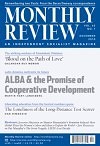Volume 62, Issue 07 (December)

On October 16, MR editor John Bellamy Foster attended a lecture in Eugene, Oregon given by James Hansen, director of NASA’s Goddard Institute for Space Studies. Hansen is the leading U.S. climatologist and the world’s foremost voice for carbon emissions reductions. According to Hansen, we are facing two major tipping points associated with climate change: (1) ice sheet disintegration in Antarctica and Greenland, leading to a massive global sea level rise; and (2) a sudden acceleration in species extinction rates (already 100 to 1,000 times the preindustrial “background rate”), as climate zones begin to move much faster than species can move in response.… Hansen’s message was clear: the future of the planet will be in many ways determined by what we do “in the next several years.” This, he insists, is not a problem to be left to the next generation, since we “could create a situation out of the control of young people by the time they become adults.” | more…
Existing international economic institutions and relations operate in ways detrimental to third world development. That is why eight Latin American and Caribbean countries—led by Venezuela, Cuba, and Bolivia—are working to build the Bolivarian Alliance for the Americas (ALBA), a regional initiative designed to promote new, nonmarket-shaped structures and patterns of economic cooperation.… In response to worsening international economic conditions, ALBA has recently stepped up efforts to promote a full-blown regional development process.… Although the precise terms of the agreement are still to be negotiated, official statements point to the creation of an integrated trade and monetary zone, with a new regionally created currency, the sucre. | more…
The Striking Workers of Faisalabad, Pakistan
The government and the bosses go hand-in-hand; more often than not, the bosses are the government.…today’s Pakistani elite are incestuously interconnected via family relations and marriages with a large patronage network of squabbling, but self-serving, interest groups. Their rationale is to keep the country and its resources for themselves: they negotiate among themselves and take the spoils from any sales to the international elite.… Against these latter-day pharaohs stand the conscious and spirited workers.… Mian Qayyum, Bawa Lalif Ansari, and Muhammad Rana [are contemporary narrators of their struggle]. | more…
Standardized testing has become central to education policy in the United States. After dramatically expanding in the wake of the No Child Left Behind Act, testing has been further enshrined by the Obama administration’s $3.4 billion “Race to the Top” grants. Given the ongoing debate over these policies, it might be useful to hear about the experiences of a hidden sector of the education workforce: those of us who make our living scoring these tests. | more…
Paul Baran and Paul Sweezy’s voluminous correspondence in the 1950s and early 1960s ranks as one of the crucial exchanges of letters between Marxist political economists in the second half of the twentieth century, and, indeed, in the entire history of Marxist thought.… Only a few letters in their extensive correspondence have been published so far.… We have thus chosen to publish two additional letters here in recognition of the joint centennial of the births of the two Pauls: Paul Baran (1910-1964) and Paul Sweezy (1910-2004). | more…
The Church of LEED, Passive House, and the Dangers of Going Green
Pat Murphy, The Green Tragedy: LEED’s Lost Decade (Yellow Springs, OH: The Arthur Morgan Institute for Community Solutions, 2009), 96 pages, $12.95, paperback.
Pat Murphy’s new book, The Green Tragedy: LEED’s Lost Decade, is a dry but worthwhile effort to debunk the U.S. Green Building Council’s (USGBC) claims regarding its flagship LEED program. Anyone interested in solid accounting of the shortcomings of the LEED rating system and the buildings it certifies will find his book compelling.… While his critique of LEED is valid, Murphy alternatively advocates for the hyper-rationality of the Passive House as a response to the ecological crisis, failing to understand that the crisis is social in origin. | more…
Hester Eisenstein, Feminism Seduced: How Global Elites Use Women’s Labor and Ideas to Exploit the World (Boulder, CO: Paradigm Publishers, 2010), 272 pages, $26.95, paperback.
Feminism Seduced, written for a general audience, presents a powerful, historically grounded critique of liberal feminism. Drawing on three decades of writing by socialist/Marxist feminists and women-of-color feminists, Eisenstein weaves a compelling account of how the central ideas of “hegemonic feminism” have legitimized the corporate capitalist assault on the working class in the United States and on small farmers and workers, both urban and rural, in the global South.… However, when Eisenstein moves from critique to offering an alternative strategy, she only recycles dualisms that have, as she acknowledges, bedeviled the women’s movement for well over one hundred years. | more…
